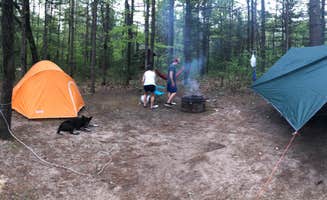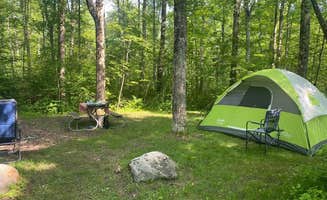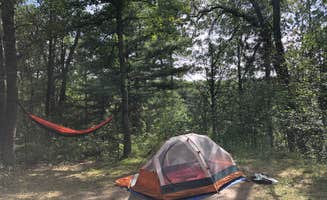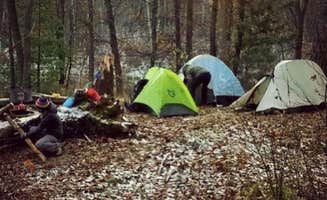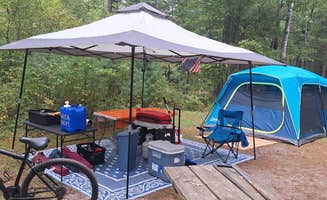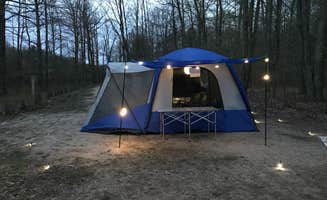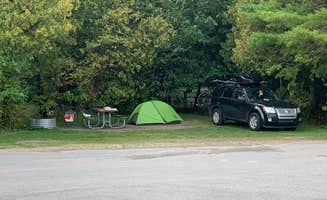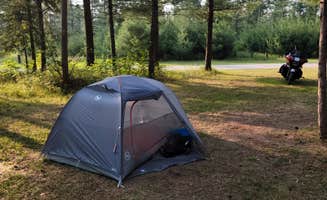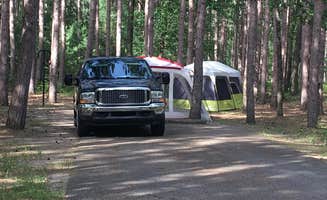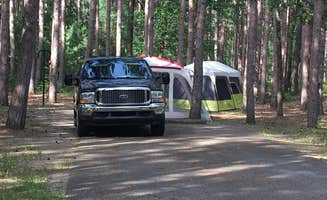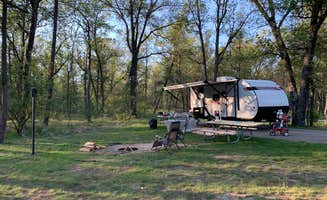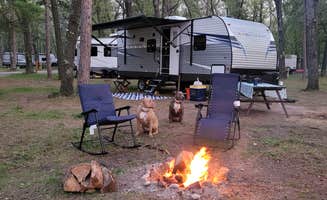The Barton City region in northeast Michigan sits within the Huron-Manistee National Forests at approximately 850 feet elevation. Winter temperatures average 15-25°F with heavy snowfall, while summer temperatures typically range from 65-80°F. Camping options near Barton City include both forested sites and lakefront locations with varying levels of access to amenities and water recreation.
What to do
Kayaking on area lakes: Jewell Lake near Barton City offers excellent paddling opportunities on a scenic, manageable lake. "The lake has an island in the middle and is great to explore by boat," notes camper Amber A., who also mentions winter opportunities: "A friend snowmobile camps here in winter, that'd be beautiful to try."
Fishing at multiple locations: Alcona Park provides access to productive fishing waters with diverse catches. "Caught lots of fish from walleye to crappie, even a 6.3lb small mouth bass!" reports Ralph E. after his stay, highlighting the variety of fish species available in the area.
Hiking forest trails: The Hoist/Reid Lake Areas offer well-marked trails for day hikes or backpacking trips. "It is such a great weekend hike to some beautiful backcountry scenery. Not heavily trafficked, and most of the campsites have a pretty decent set up from past campers," according to Kate K., who appreciates the low visitor density.
Beach exploration: Lake Huron shoreline at Ossineke State Forest Campground provides areas for swimming and beachcombing. "We tent-camped in August and swam twice a day in that beautiful crystal clear water," reports Mary H., who valued the water access directly from her campsite.
What campers like
Privacy between sites: Camping areas around Barton City typically offer good separation between neighbors. A visitor to Ossineke noted, "The sites are large, and some humongous. The campground is quiet, and the lake is right behind the campground." This spaciousness allows for a more secluded experience even at established campgrounds.
Nearby small towns: The proximity to local communities enhances the camping experience. "We take our bikes with us and ride up town. The town is very small, but worth visiting," shares one Harrisville camper. Another visitor mentions, "Walking distance from Barton City," when describing Jewell Lake's convenient location.
Winter recreation opportunities: The area maintains seasonal appeal beyond summer. At Reid Lake Foot Travel Area, Dan N. reports, "I've only been in the fall when the leaves are perfect and no one is there, but I don't expect it'd be crowded any other time of year either. Great wildlife." The region supports cold-weather activities like snowmobiling and winter hiking.
Rustic camping atmosphere: Many visitors appreciate the basic amenities and natural setting. Joseph R. explains his experience at Ossineke: "Beautiful woodsy sites. Most are well spaced and offer lots of privacy. Many sites offer lake front access. The vault toilets were clean, odor was minimal and they had hand sanitizer."
What you should know
Limited cell service: Connectivity varies significantly throughout the region. At Alcona Park, one camper noted, "Cell phone reception is nill here so do not plan to make or receive calls!" This limitation affects communication and navigation in remote areas.
Campground maintenance issues: Some state forest facilities may have ongoing repair needs. A visitor to Ossineke observed, "There needs to be some maintenance done at this campground, at least two water pumps are without handles, one was without a handle three years ago as well."
Wildlife encounters: Local wildlife may visit campsites. At Ossineke, Joseph R. warns, "The red squirrels are pretty relentless, so keep your food and garbage locked up when you're not around." More significant wildlife may also be present in less developed areas.
Reservation systems vary: Different campgrounds follow different booking procedures. One camper at Alcona Park explains, "You can make reservations for the campground starting April 1st via telephone; however they do not answer the phone as they are busy helping the seasonal campers get their sites."
Tips for camping with families
Look for campgrounds with playgrounds: Some facilities provide dedicated areas for children. At Alcona Park, Becky K. mentions there are "hiking trails and a playground for the kids," which helps keep younger campers entertained.
Consider noise levels: Harrisville State Park can be bustling during peak season. One visitor observed, "If you enjoy peace and quiet, DO NOT CAMP HERE. This park is off the chain with kids, bikes, animals, and noise!" Another camper noted similar concerns: "One of the noisiest places I have ever camped, although quiet hours were enforced luckily."
Water safety preparation: Many sites offer water access with varying conditions. At Ossineke, a camper advises, "A nice sandy shoreline and shallow water makes for a relaxing day," indicating suitable conditions for families with small children who need gentler water entry points.
Book waterfront sites early: Prime locations fill quickly, especially during summer. "The camp spots were spacious and all were either on the water or had a path to the water," notes a visitor to Ossineke, highlighting the popularity of water-adjacent sites.
Tips from RVers
Check for electric hookups: Power availability differs between campgrounds. At Alcona Park, a camper mentioned, "They do have a full hookup area that is nice. Perhaps I could try that side of the campground," suggesting varying utility options within the same facility.
Site size considerations: Some campgrounds have limitations for larger rigs. A camper at Pine River Campground notes, "Great sites where you don't feel like you are on top of other campers," indicating adequate spacing for recreational vehicles.
Dumping station access: Facility availability varies by location. One visitor observed at Harrisville State Park, "The dump station is good and wasn't very busy," providing valuable information for RVers planning longer stays who need to manage waste systems.
Electric amperage limitations: Power capacity may not meet all needs. An Alcona Park camper warned about "20 amp electricity on most sites," which may be insufficient for RVs with higher power requirements for air conditioning or other appliances.


